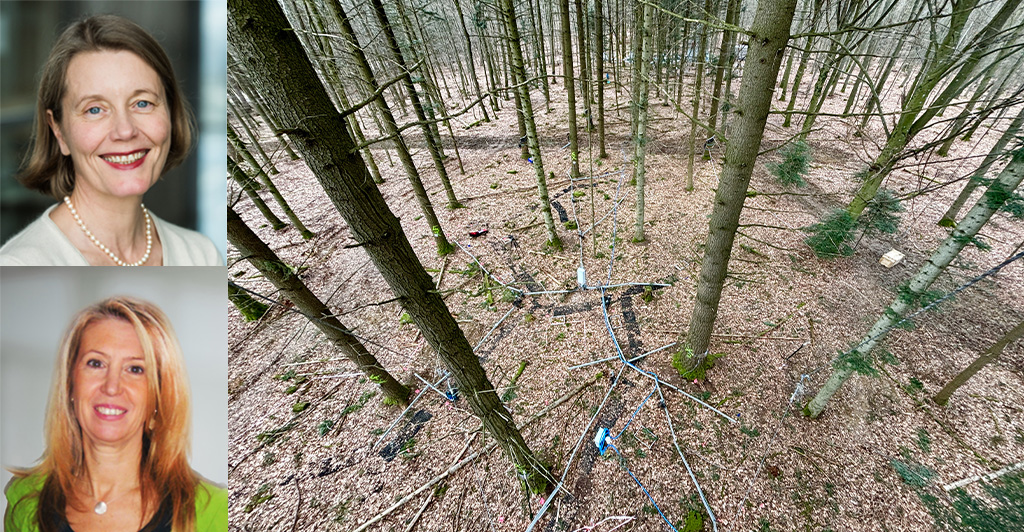International Day of Forests: How technological innovation improves understanding of stressed forests
Freiburg, Mar 18, 2024
The United Nations has declared 21 March 2024 as the International Day of Forests under the motto “Forests and Innovation: New Solutions for a Better World.” In doing so, the United Nations wants to recognise the role of new technological developments that contribute to the protection and conservation of global forests. “As ecologists, we have always relied on technology for our measurements in forests and other ecosystems,” comments Prof. Dr Christiane Werner, Professor of Ecosystem Physiology at the Faculty of Environment and Natural Resources at the University of Freiburg. However, conventional measuring instruments have considerable limitations because they are often very expensive, large and complex to install so they can usually only be used to measure individual trees. “As a result, such measurements do not have a high spatial resolution. In addition, they are invasive, meaning that the sensors injure or damage the trees, interfere with nature and disturb the ecosystem,” adds Prof. Dr Ulrike Wallrabe, Professor of Microactuators at the Department of Microsystems Engineering (IMTEK) at the University of Freiburg.

ECOSENSE test setup in the forest near Ettenheim (photo: Yannick Layer), Ulrike Wallrabe (upper left, photo: Klaus Polkowski), Christiane Werner (lower left, photo: private)
However, the development of modern microsystems is opening up new avenues for forest research. “We have observed an international trend towards building intelligent networks of distributed sensors in forests, which can be used to carry out distributed and detailed measurements and thus gain completely new insights,” says Werner. “By making the systems smaller, we can try to measure as non-invasively as possible and disturb the ecosystem as little as possible,” explains Wallrabe.
Measurements are made with distributed sensor networks on many individual leaves and roots
Together, Werner and Wallrabe are speakers for the ECOSENSE Collaborative Research Centre at the University of Freiburg, which was established in 2022 and aims to develop robust, energy-autonomous and cost-effective sensor networks for measuring forests. The ECOSENSE approach is unique. Instead of relying on prefabricated sensors, environmental scientists work together with microsystems engineers to develop sensor technology, data transmission techniques and manufacturing processes. This results in small networked sensors that can be attached to individual leaves or roots. “This approach allows us to measure individual leaves, individual root-soil interactions or other small-scale processes in all their heterogeneity in real detail and in large numbers,” explains Werner.
The data will help the researchers to better understand how climate change, pest infestation and other stress factors affect forests. “The droughts for the past few years have shown how different the effects of climate change are on forests. Anyone who walks through nature knows this: there is a group of trees that has died, and right next to it are healthy trees of the same species. In future, we will be able to understand such heterogeneous processes much better with the help of high-resolution measurements,” says Werner. The first sensor networks developed by ECOSENSE are now being tested in a test forest in Ettenheim, near Freiburg, with major support from the local authority. The initial aim is to measure photosynthesis activity, water and carbon exchange at roots and leaves, as well as the excretion of volatile organic compounds, which are important markers for stress reactions in trees. According to Werner, the data can in turn be used to draw conclusions for adapting forest to climate change, for example with regard to the best combinations of tree species and soils.
Dirt, moisture and insects: the forest as a challenge for microsystems engineering
However, the use of modern microtechnology in the forest presents researchers with a difficult task, emphasises Wallrabe. “For us as microsystems engineers, the forest presents an enormous challenge. There are large temperature ranges and solar radiation that age the materials of the sensors. We have to contend with moisture, dirt, dust and pollen. There are insects crawling into every crack. And even the development cycles of the technology have to adapt to natural rhythms. A leaf sensor is of no use to me if it is only ready in September at the end of the growing season.” To counter these problems, ECOSENSE is also conducting research into surfaces that are durable and self-cleaning, but which do not require antibacterial and fungicidal agents and therefore have as little impact on the ecosystem as possible.
Wallrabe and Werner emphasise that the main aim of ECOSENSE is to develop a set of sensors that can be produced cheaply and easily used by other researchers and, in some cases, by forestry practitioners. The scalability and broad applicability of the sensor technology is crucial, says Werner, because “there won’t be a simple solution with which we can adapt all forests equally to climate change. In every forest there are individual interactions between the soil conditions, the tree population, the species composition, the environmental factors and the climate. We hold the vision that our mobile toolbox of sensors can be used to take measurements at many different locations and thus analyse the specific interactions at the respective sites.” In this way, technological innovation can make an important contribution to better understanding forests and preparing them for the future.
Ulrike Wallrabe and Christiane Werner are available for media interviews.
Prof. Dr-Ing. Ulrike Wallrabe
Professor of Microactuators
University of Freiburg
Tel: +49 761 203-7580
wallrabe@imtek.uni-freiburg.de
Prof. Dr Christiane Werner
Professor of Ecosystem Physiology
University of Freiburg
Tel: +49 761 203-8301
c.werner@cep.uni-freiburg.de
Overview of facts:
- The Collaborative Research Center 1537 “ECOSENSE - Multi-scale quantification and modelling of spatio-temporal dynamics of ecosystem processes by smart autonomous sensor networks” is funded by the German Research Foundation (DFG). More about his work here: https://www.ecosense.uni-freiburg.de/
- Ulrike Wallrabe and Christiane Werner are joint speakers for ECOSENSE. Mrs Werner is also Principal Investigator at the Cluster of Excellence initiative “Future Forests.”
- More about the International Day of Forests: https://www.fao.org/international-day-of-forests/en/
Contact:
Office of University and Science Communications
University of Freiburg
Tel.: 0761/203-4302
e-mail: kommunikation@zv.uni-freiburg.de

